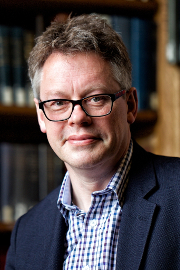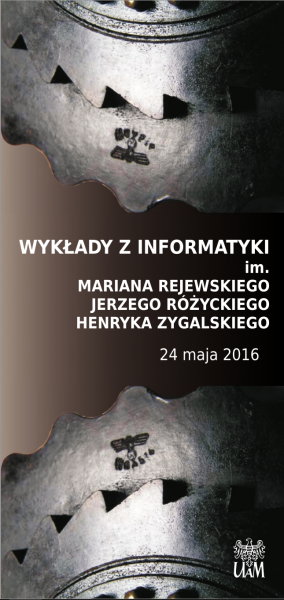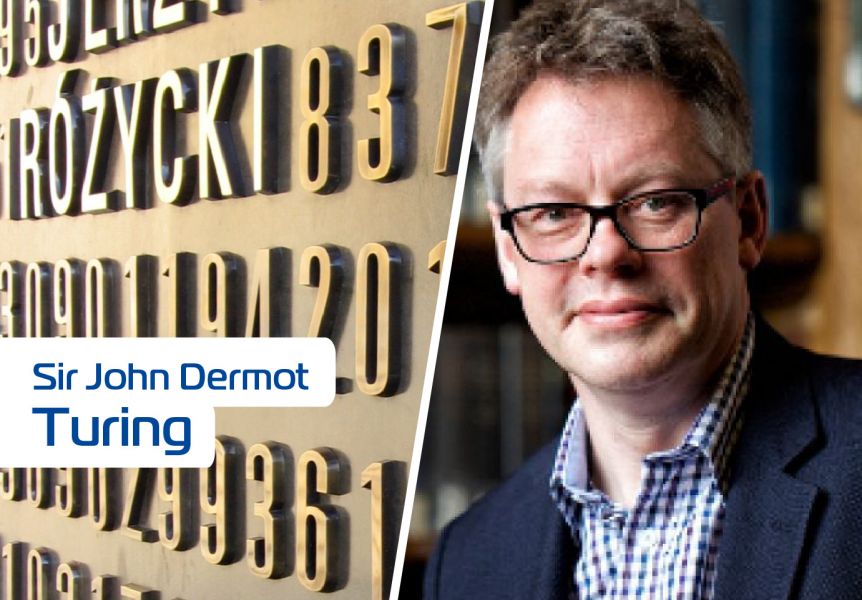Date: tuesday, 24.05.2016,15:30
Speaker: Sir John Dermot Turing
Titile: Alan Turing and the Enigma
Abstract: In January 1940 Alan Turing was sent to Paris to exchange vital knowhow with the Polish codebreakers, then working in exile for French intelligence. What was Alan Turing’s role in the breaking of Enigma? To what extent did his work proceed independently and to what extent was it building on the work done in Poland in the 1930s? What was the significance of the 1940 meeting? And how did Alan Turing’s work on Enigma shape his achievements in the years to come? The lecture will look at these questions, and position the British work on Enigma into the context of both the Polish achievements and Alan Turing’s remarkable life.
Video
Program
| 24.05.2016 r. | |
| 10:00 | Laying flowers at the monument to the Polish cryptologists |
| 15:00 | Before the lecture: Meeting at the faculty profesors' club |
| 15:30 | Dermot Turing Alan Turing and the Enigma Hall A of Faculty of Mathematics and Computer Science |
Speaker
 Sir John Dermot Turing was educated at Sherborne School, King’s College, Cambridge, and New College, Oxford, where he completed his DPhil in Genetics. After a few years in the Government Legal Service and The College of Law he joined the international law firm Clifford Chance in 1990 as a trainee, and he spent the remainder of his professional career at that firm. He qualified as a solicitor of the senior courts of England and Wales in 1991. He became a partner in 1999 and stepped down from the partnership in 2014. Since then he has been a consultant to the firm on an ad-hoc basis. His legal specialism for the last few years has been focused around financial services regulation, with particular emphasis on market infrastructure, failed banks, payments and financial stability. He is the author of Managing Risks in Financial Firms (2nd ed, Tottel Publishing, 2009) and Clearing and Settlement in Europe (2nd ed, Bloomsbury, 2016 forthcoming). He was appointed in 2016 to the European Commission’s ‘European Post Trade Forum’ as an independent expert.
Sir John Dermot Turing was educated at Sherborne School, King’s College, Cambridge, and New College, Oxford, where he completed his DPhil in Genetics. After a few years in the Government Legal Service and The College of Law he joined the international law firm Clifford Chance in 1990 as a trainee, and he spent the remainder of his professional career at that firm. He qualified as a solicitor of the senior courts of England and Wales in 1991. He became a partner in 1999 and stepped down from the partnership in 2014. Since then he has been a consultant to the firm on an ad-hoc basis. His legal specialism for the last few years has been focused around financial services regulation, with particular emphasis on market infrastructure, failed banks, payments and financial stability. He is the author of Managing Risks in Financial Firms (2nd ed, Tottel Publishing, 2009) and Clearing and Settlement in Europe (2nd ed, Bloomsbury, 2016 forthcoming). He was appointed in 2016 to the European Commission’s ‘European Post Trade Forum’ as an independent expert.
Dermot Turing is the nephew of Alan Turing (1912-1954), who is well known to have been one of Bletchley Park’s leading cryptanalysts as well as a founder of the computer science and of the science of artificial intelligence. Bletchley Park - the place where the British codebreaking organisation was located during World War 2 - has been largely saved and is now a thriving heritage site and education centre. Dermot Turing was asked in 2011 to become the honorary president of the Alan Turing Centenary Advisory Committee. In 2012 he became a trustee of Bletchley Park. He wrote an illustrated guide for Bletchley Park visitors on the operation of the Bombe, the machine which the codebreakers designed to help find the daily settings on the famous Enigma machine. Dermot Turing has also written a biography ‘Prof’: Alan Turing decoded, (The History Press, 2015) of his famous uncle, on whose life and work he gives frequent lectures.
Dermot Turing is now working on a new book about the Polish codebreakers who first tackled the Enigma problem, the remarkable story of their cooperation with the Allies before and during World War 2, and what became of them in the end.
Dermot Turing is also a trustee of the Turing Trust, a small educational charity with a focus on placing reuseable computers into schools in Ghana and other parts of Africa.








